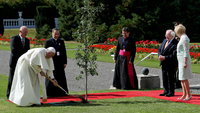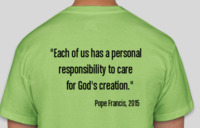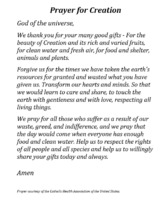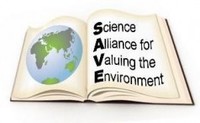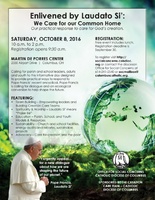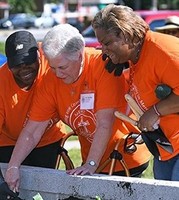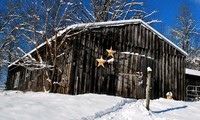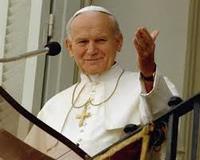Search
18 items
-
San Diego Creation Care Team Success Stories
Catholic Climate Covenant has created two short videos to discuss how different churches in the San Diego diocese in California have worked to be better stewards of God’s creation. The parish of Our Mother of Confidence in San Diego, California, has taken action to reduce water and energy usage while the Saint James Parish and Academy in Solana Beach, California, has implemented environmentally conscious projects and initiatives in their community. -
Dayton Divests
In June 2014, the University of Dayton became the first Catholic university in the United States to announce their divestment from coal and fossil fuels. Members of the university staff see this move as part of the university’s commitment to “being a responsible steward of the Earth’s natural resources.” This decision was commended by the president of the Association of Catholic Colleges and Universities. Their decision was one inspired by faith reflection as well as a commitment to financial stability for the university.
Beyond divesting from coal and fossil fuels, the university has taken further steps to move their campus toward efficiency and sustainability. The university now has two full time employees who work to improve campus sustainability and offers academic programs in these areas as well. The University of Dayton is also home to the Hanley Sustainability Institute. -
Pope Tells Oil Executives to Act on Climate: "There Is No Time to Lose’”
This past Saturday, the pope gathered leaders of the world’s largest oil companies for a closed-door conference at the Vatican. He commended oil and gas companies for progress made in developing more careful approaches to assess of climate risk and adjustments made to their business practices. However, these actions are not enough. Pressure has been building on oil and gas companies to transition to less polluting forms of energy, often coupled with the threat of fossil-fuel divestment.
The pope reiterated his call for a transition from fossil fuels “to a greater use of energy sources that are highly efficient while producing low levels of pollution.” He emphasized that the poor who would suffer the most from the effects global warming. And that we owe it to the poorer countries and future generations. -
Irish Bishops Announce Divestment from Fossil Fuels Ahead of the Pope's Visit
The Irish Catholic Bishops Conference announced it would divest from fossil fuels hours before the arrival of Pope Francis. The bishop's move means withdrawing investments in 200 oil and gas companies within five years. The bill was introduced in the Irish Parliament, requiring the country’s sovereign wealth fund to divest from all fossil fuels. If the Irish bill passes, it will make Ireland the first government to divest from fossil fuels. -
Creation Care t-shirt designed by the Creation Care Council of Our Lady of Perpetual Help (OLPH)
These t-shirts with a quote from Pope Francis's encyclical Laudato Si' were created for members of the Creation Care Council of OLPH to wear at creation care events sponsored by their church. -
Resources for Preaching: On Caring for God's Creation
Resources for Preaching: On Caring for God's Creation offers that one does not need to be an expert in the field to preach about environmental justice. The authors encourage homilists to focus on what they know, what's around them, and what can be learned relatively easily. One example is to draw upon surrounding physical beauty or examine what is being destroyed in the area. This resource provides an outline of pertinent themes that can lead to future discussions, as well as opportunities to incorporate crucial eco-friendly messages into parishioners daily lives. -
Prayer for Creation
This Prayer for Creation reminds us to give thanks for the basics of living that nature provides us and to ask for forgiveness for the times that we have taken the Earth's resources for granted. It is also a reminder that the vulnerable often do not even have regular access to clean food and/or water. -
Engaged Organizations: Springs Dominican motherhouse, Columbus, OH
The Springs Dominican motherhouse hosts 150 individuals (maintaining 76 beds). Initial green projects included replacing their lights with LED bulbs and replacing seven boilers, which had been there since the 1940s, with just one new one. Recently, Innovative Organic Recycling composting company had been invited to speak with house members, and their composting program took off from there. Jean Sylvester, Motherhouse Administrator, had found it easy to do at her own house and was also aware of Shepherd’s Corner success with it. Both staff and residents adapted quickly and the process is streamlined at this point. Composting is done by the sisters themselves, with administration providing the bags and cans. In addition to composting food, even the bones, all of plates and cups, including coffee cups, can be composted as well.
For administration, this is a business model that makes practical sense. Management had been quoted at $35 per pick up, so they decided to give it a two-week trial period. Overall, composting has been a "win-win" for them, with its ease of implementation and minimal ongoing efforts. In addition, their dock smells better because the food waste bags are not left open in the dumpster now. There is also less garbage for RUMPKE to take, so the project cost savings of waste management will be reaped over time . -
Engaged Organizations: Shepherd's Corner, Blacklick, OH
In 1966, the Dominican Sisters of Peace had purchased 160 acres of land in Blacklick, Ohio, for what eventually evolved into the formation of various farms and ecology centers. Shepherd’s Corner is one part of this larger network. Srs. Rosie Ann Van Buren and Marguerite Chandler maintain their 1.5 acres well and use the area predominantly for educational purposes, with most food (usually 60-65% but more recently 80%) donated to local food pantries.
The following are some of the current activities and events that take place at Shepherd’s Corner: Sorting donated food from Fresh Market's food waste into compost or food to animals, Shepherd’s Fest, 5K – their main fundraiser, walking trails throughout the property, groups volunteering to garden, St. Charles high school students volunteering one Saturday per month, Meet the Animals, space rentals, school groups walk through the woods, small farm stand every Tuesday (run by Julie Laudick), slide show, calendar designed with a plan of action or set of events for each month. Srs. Rosie and Marguerite also monitor the water for Blacklick Creek, along with other individuals who are affiliated with county soil and water work.
Shepherd's Corner offers several group activities as well:
School groups and other youth groups, grades 3, 4, and 5 are invited to Shepherd’s Corner for educational programs. Cost per student is based on length of program and supplies needed.
Adult groups can enjoy the space for tranquility meditation, and prayer. Staff is available to give tours and lead sessions on special topics such as spirituality, universe story, nature and gardening. Fees are based on length of program and services provided.
They also offer use of our space to groups whose mission is compatible with ours. Please contact Miranda Land at scecologycenter@gmail.com regarding facility rental. -
Creation Care Tips Winter 2020
This Creation Care bulletin insert provides a message from Pope Francis on how even small actions on a daily basis can impact the earth and fellow humans in great ways. It focuses on reducing waste by composting, cutting back on purchases, and recycling. -
Hitzhusen to Deliver Lecture on Spirituality and Sustainability on Sept. 20 in Sylvania, OH
The Science Alliance for Valuing the Environment, an “educational consortium for environmental concerns” affiliated with Lourdes University in Sylvania, OH, will host Dr. Greg Hitzhusen to deliver a lecture on “Spirituality and Sustainability: Hope for All Creation” at the Franciscan Center from 7:30-9:00pm on Tuesday, Sept. 20.
Attend this FREE public lecture hosted by S.A.V.E. – Science Alliance for Valuing the Environment.
To read more about this event please click on the link below: -
Today is registration deadline for Columbus Diocese Creation Care Conference on Oct. 8
The Columbus Diocese is offering a day of reflection, inspiration, study, and sharing of resources to help Columbus area Catholic communities respond to Pope Francis’ environmental urgings in his recent encyclical, Laudato Si: Caring for Our Common Home. The conference: “Enlivened by Laudato Si’: We Care for our Common Home: Our practical response to care for God’s creation” will be held at the Martin De Porres Center in Columbus from 10am-2pm on Saturday, October 8.
The conference will feature creation care team building sessions, spirituality and worship, education, sustainability information for energy savings, and advocacy to care for creation and the poor. Dr. Greg Hitzhusen of the School of Environment and Natural Resources at Ohio State will deliver a keynote address. -
Engaged Organizations: Sisters of Mercy of the Americas
Sisters of Mercy of the Americas has both sponsored and co-sponsored faith based organizations that focus on ecological issues. One of the organizations is Mercy Ecospirituality Center. -
Engaged Organizations: Mercy Ecospirituality Center
Mercy Ecospirituality Center discuss their various environmental/spiritual offerings of their retreat center on their website:
"Mercy Ecospirituality Center of Mercy Ecology, Inc. is a sponsored work of the Sisters of Mercy. We are committed to reflection, education and living gently in mutual relationship with the Earth. We offer hospitality for those seeking solace and to refresh their spirit in the beauty of creation, as well as programs in ecospirituality.
The Benedictine monks of Elmira, NY gave the 39-acre property located in the rural beauty of Vermont to the Vermont Sisters of Mercy. Sisters Judy Fortune and Elaine Deasy directed it as Lumen Christi Retreat House for many years, but after Lumen Christi closed, a group of Sisters established it as an Ecospirituality Center, originally named Mercy Farm in 2010." -
Pope Francis' Speech on UN World Environment Day
Pope Francis's speech on the United Nations World Environment Day emphasizes the importance of world solidarity to counter what he deems a current culture of waste. One prevailing message is the danger of consumerism. The pope extends a challenges to forgo excessive wealth in exchange for living a more simplistic lifestyle, which can help combat world health and hunger issues. -
Common Declaration on Environmental Ethics
On June 10, 2002, Pope John Paul II and Ecumenical Patriarch Bartholomew I issued a declaration on the environment. The introduction to the declaration is stated below:
"We are gathered here today in the spirit of peace for the good of all human beings and for the care of creation. At this moment in history, at the beginning of the third millennium, we are saddened to see the daily suffering of a great number of people from violence, starvation, poverty and disease. We are also concerned about the negative consequences for humanity and for all creation resulting from the degradation of some basic natural resources such as water, air and land, brought about by an economic and technological progress which does not recognize and take into account its limits." -
Five Years After Speaking Out on Climate Change, Pope Francis Sounds an Urgent Alarm
This article covers Pope Francis's reaction to the world governments responses to climate change. The Pope writes to unite people through religion in an effort to bring awareness to the movement. The article details how the church is divesting in fossil fuel companies. The article also focuses on the political divide and how it affects people's views on the climate crisis. -
How to Green your Parish
This article is about the importance of parishes to participate in environmentally sustainable actions based on Pope Francis’s Laudato Si’. It encourages parishes to strive to become more eco-friendly by taking work together as a community and focusing on change one issue at a time. The article focuses on three main areas: reducing the parishes greenhouse gas, sustaining food and land use, and preserving water.




